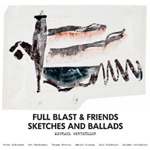|
|
 |
Dusted Reviews
Artist: Full Blast & Friends Album: Sketches and Ballads Label: Trost Review date: Feb. 16, 2012 |

|
|
|
 |
Accommodation isn’t the first word that comes to mind when one thinks of Peter Brötzmann. The German saxophone/clarinet/taragato player is legendary for his uncompromising aggression, intensity and volume. If you play with him, you have to deal with everything that he brings or you just shouldn’t bother. He’s also a man who has made it a point to get out there and play; over half a century after he first took the stage (he turned 70 five months after this concert recording took place in October 2010), he still maintains a grueling tour schedule (ex: 10 dates in seven countries during February 2012).
But when I first encountered Full Blast, his trio with electric bassist Marino Pliakas and drummer Michael Wertmüller, they seemed to take stern rigidity to an extreme. There was precious little give and take between Brötzmann and his younger band-mates; he played whatever he played while they provided momentum and a sturdy frame. Of all his going concerns, this wasn’t the one where I expected Brötzmann to subordinate himself to an accompanist’s agenda, but that’s exactly what happens on Sketches and Ballads.
The album is a single piece composed by Wertmüller and performed by the trio and three guests. Fifty pages in length, it’s densely charted and studded with rhythms so forbiddingly complex you could forgive a machine for fucking them up. Despite the titular reference to sketches, nothing — not even the freely improvised moments — feels dashed-off; rather, Wertmüller was thinking of the richly detailed charts Gil Evans arranged for Miles Davis’s Sketches of Spain. But while Sketches of Spain is a concerto for one soloist, Wertmüller diffuses the spotlight between the six players. The first horns you hear belong to multi-reedist Ken Vandermark and trumpeter Thomas Heberer, who nail some elaborate figures before giving way to a brief roar from the old man.
For once, Full Blast is not Brötzmann’s band, although they hang on to parts of their familiar dynamic. He’s like a found object, hung and re-hung at different points in a constantly shifting tableau. Wertmüller’s score is in charge, ringing changes between lamenting brass, roiling group explosions, and percussion interludes so tricky and manic that Weasel Walter or Frank Zappa could have composed them. Any one of these parts could get exhausting, but the constant shift between them keeps the composition engaging throughout its 36-minute length.
By Bill Meyer
|







